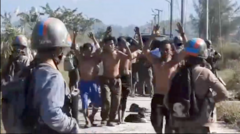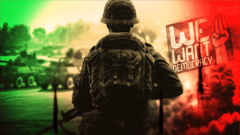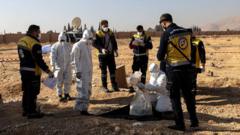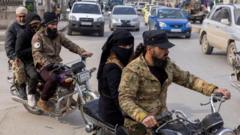After a brutal siege, the insurgent group Arakan Army has overtaken the last military-controlled barracks in northern Rakhine, asserting dominance in the region amidst a backdrop of deadly civil conflict and humanitarian concerns for the displaced Rohingya population.
Military Defeats Transform Rakhine State: Arakan Army Gains Control

Military Defeats Transform Rakhine State: Arakan Army Gains Control
The Arakan Army's recent capture of a military barracks marks a significant shift in control in Myanmar's Rakhine State, raising questions regarding its governance and the ongoing humanitarian crisis.
The siege of the BGP5 barracks by the Arakan Army (AA) culminated in a fierce battle that has altered the power dynamics in Myanmar’s Rakhine State. After an intensive barrage of artillery and gunfire, the last stronghold of the Border Guard Police (BGP) fell to the insurgent group, marking a significant territorial victory for the AA. This development represents not only a militaristic triumph but also a critical moment in the ongoing civil unrest that erupted following the military coup in 2021.
Video evidence surfaced from the AA, showcasing soldiers engrossed in combat, many armed with various weapons, while Myanmar's air force conducted airstrikes in a desperate bid to reclaim control. An AA source highlighted the extensive fortifications at BGP5, mentioning sharpened ditches and numerous mines, which resulted in considerable casualties among its ranks—a point underpinned by the reported deaths of over 450 soldiers during the siege.
This defeat is particularly humiliating for General Min Aung Hlaing, the leader of the Myanmar military junta, as the Arakan Army's string of victories indicates a worrying trend for the junta, culminating in the loss of control of an entire section of the border with Bangladesh. The AA now commands a significant portion of northern Rakhine State, with the capital, Sittwe, being one of the few remaining military-held areas.
The BGP5 barracks, built on land previously occupied by a Rohingya village, has now become a focal point of this conflict, reflecting the historical and ongoing tensions surrounding the Rohingya population and the Rakhine ethnic group. The ongoing conflicts have led to a devastating humanitarian crisis, characterized by mass displacement and destruction, with reports of 80% of housing in Maungdaw, the region surrounding BGP5, being destroyed.
The rising power of the Arakan Army invites new questions regarding the future governance of Rakhine. Their success is attributed in part to effective and motivated leadership that has gained considerable local support amidst longstanding grievances regarding poverty and neglect from the central Myanmar government.
However, challenges are mounting as the AA seeks to govern while facing an overwhelming number of displaced individuals, including approximately 600,000 Rohingyas still residing in the region. Relations between the AA and the Rohingya community have historically been strained, exacerbated by the fact that many Rohingya groups sided with the military in opposition to the AA. The AA's treatment of people from the Rohingya community remains a pivotal concern for humanitarian organizations as famine looms and access to aid is severely limited.
Potential international and regional responses to the AA's governance, particularly in light of China's interest in mediating a negotiated settlement, will significantly influence the future landscape of Rakhine and the broader Myanmar context. The Arakan Army's ambitions and ability to maintain stability amid ongoing conflict will be crucial determining factors in the path forward for all ethnic communities in the region.





















